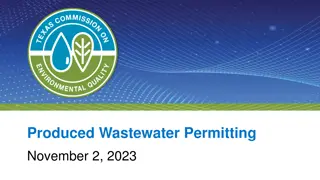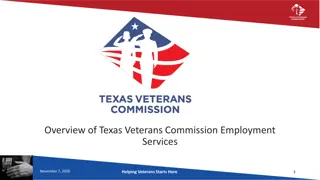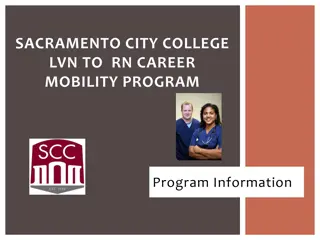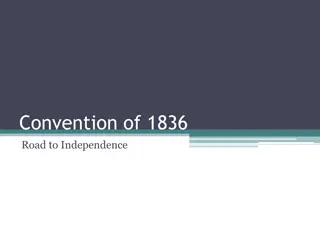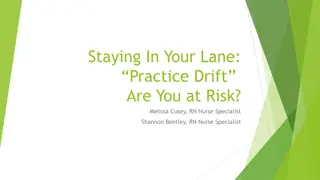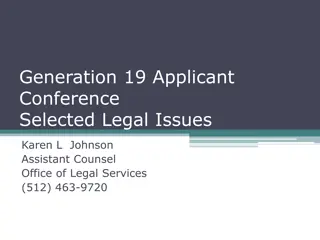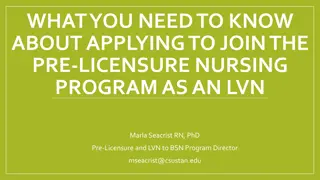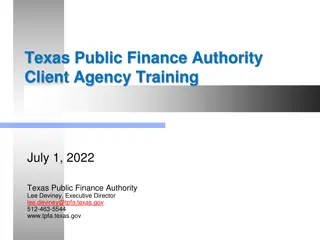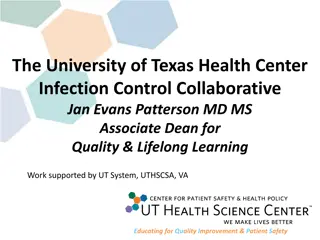Understanding LVN Scope of Practice in Texas
Explore the role of the Board of Nursing, review LVN Scope of Practice, differentiate between RN and LVN nursing practice, and consider models for safe LVN practice in Alabama. Learn about the history and purpose of the Board of Nursing, standards of nursing practice for all nurses, and specific responsibilities of RNs and LVNs in healthcare settings.
Download Presentation

Please find below an Image/Link to download the presentation.
The content on the website is provided AS IS for your information and personal use only. It may not be sold, licensed, or shared on other websites without obtaining consent from the author. Download presentation by click this link. If you encounter any issues during the download, it is possible that the publisher has removed the file from their server.
E N D
Presentation Transcript
LVN SCOPE OF PRACTICE TALA August, 2018 Linda Abel, RN
OBJECTIVES Understand the role of the Board of Nursing Review the LVN Scope of Practice Differentiate between RN and LVN nursing practice Review the concerns associated the LVN practice in AL Consider some models for safe practice by LVNs in AL
History and Purpose of the Board of Nursing The Nursing Practice Act (NPA) creates the Board of Nursing (BON) 2004 RN and LVN Boards were merged and in 2007 the Board of Nurse Examiners was renamed Board of Nursing The purpose of the Board of Nursing: To protect and promote the welfare of the people of Texas by ensuring that each person holding a license as a nurse in the State of Texas is competent to practice safely. (Texas Occupations Code Chapter 301)
Standards of Nursing PracticeALL nurses (217.11) Some standards apply to all nurses LVN, RN, APRN: (1) (A) Know and conform to the Texas NPA and the board s rules and regulations as well as all federal, state, or local laws, rules or regulations affecting the nurse s current area of nursing practice; (D)Accurately and completely report and document (i) the client s status including signs and symptoms (ii) nursing care rendered; (iii) physician, dentist or podiatrist orders; (iv) administration of medications and treatments;
Standards, continued (v) Client response(s); and (vi) Contacts with other health care team members concerning significant events regarding client s status; (H) Make a reasonable effort to obtain orientation/training for competency when encountering new equipment and technology or unfamiliar care situations; (M) Institute appropriate nursing interventions that might be required to stabilize a client s condition and/or prevent complications; (T) Accept only those nursing assignments that take into consideration client safety and that are commensurate with the nurse s educational preparation, experience, knowledge, and physical and emotional ability.
RN and LVN Nursing RN LVN Professional nursing Vocational nursing Independent role Supervised role Develops and implements the nursing process Assists in the development and implementation of the nursing process Supervises, coordinates, delegates NPA 301.002 (5) and 301.353 NPA 301.002 (2)
LVN Practice and Education Directed Directed scope of nursing practice in which supervision is required. Performance of an act that requires a specialized judgment and skill, the proper performance of which is based on knowledge and application of the principles of biological, physical, and social science as acquired by a completed course in an approved school of vocational nursing. NPA 301.002 (5) Basic education (nursing school): 558 hours of theory 840 hours of clinical Continuing Education Position statement 15.10-Continuing Education: Limitations for Expanding Scope of Practice. Clarifies that expansion of an individual nurse s scope of practice has licensure-related limitations. Informal continuing education or on-the-job training cannot be substituted for formal education leading to the next level of practice/licensure. In-Services Board rule 217.11 (1) (G) Obtain instruction and supervision as necessary when implementing nursing procedures or practices
Standards Specific to Vocational Nurses- Rule 217.11 (2) The licensed vocational nurse practice is a directed scope of nursing practice under the supervision of a registered nurse, advanced practice registered nurse, physician s assistant, physician, podiatrist, or dentist. Supervision is the process of directing, guiding and influencing the outcome of an individual s performance of an activity. The licensed vocational nurse shall assist in the determination of predictable healthcare needs of clients within healthcare settings and: (A) Shall utilize a systematic approach to provide individualized, goal-directed nursing care by: i. Collecting data and performing focused nursing assessments; ii. Participating in the planning of nursing care needs for clients; iii. participating in the development and modification of the comprehensive nursing care plan for assigned clients
LVN Standards, continued iv. Implementing appropriate aspects of care within the LVN s scope of practice; and Assisting in the evaluation of the client s responses to nursing interventions and the identification of client needs; v. (B) Shall assign specific tasks, activities and functions to unlicensed personnel commensurate with the educational preparation, experience, knowledge, and physical and emotional ability of the person to whom the assignments are made and shall maintain appropriate supervision of unlicensed personnel. (C) May perform other acts that require education and training as prescribed by board rules and policies, commensurate with the licensed vocational nurse s experience, continuing education, and demonstrated licensed vocational nurse competencies.
Supervision Supervision is Required Supervision is Required The practice of vocational nursing must be performed under the supervision of a registered nurse, physician, physician assistant, podiatrist or dentist. Supervision Supervision Supervision is defined as the active process of directing guiding, and influencing the outcome of an individual s performance of an activity. Rule 217.11 (2)
Supervison concerns In recent years, the trend has seen LVNs moving toward more community settings, including assisted living, where there are more concerns about supervision and practice. Lack of RN oversight On-call duties Medication policies and procedures Inadequate documentation
Board Position Statement: Supervision Supervision is required for the LVN scope of practice. LVNs are not licensed for independent nursing practice. A LVN must ensure that he/she has an appropriate clinical supervisor. Proximity of the clinical supervisor depends on skills and competency of the LVN, patient conditions and practice setting. Direct, on-site supervision may not always be necessary depending on the LVN s skill and competence and should be determined on a case-by-case situation taking into consideration the practice setting laws. However, clinical supervisors must provide timely and readily available supervision and may have to be physically present to assist LVNs should emergent situation occur.
Board Position Statement: Setting Setting may include areas with well-defined policies, procedures and guidelines with assistance and support from appropriate clinical supervisors. As competencies are demonstrated, if the LVN transitions to other settings, it is the LVN s responsibility to ensure he/she has an appropriate clinical supervisor and that the policies, procedures and guidelines for that particular setting are available to guide the LVN practice.
Board Position Statement: Assessment Assists, contributes and participates in the nursing process by performing a focused assessment on individual patients to collect data and gather information. A focused assessment is an appraisal of the situation at hand for an individual patient and may be performed prior to the RN's initial and comprehensive assessment. The LVN reports and documents the assessment information and changes in patient conditions to an appropriate clinical supervisor.
Board Position Statement: Planning Uses clinical reasoning based on established evidence-based policies, procedures and guidelines for decision-making. May assign specific daily tasks and supervise nursing care to other LVNs or UAPs.
Board Position Statement: Implementation Provides safe, compassionate and focused nursing care to patients with predictable health care needs. Implements aspects of the nursing care plan, including emergency interventions under the direction of the RN or another appropriate clinical supervisor. Contributes to the development and implementation of teaching plans for patients and their families with common health problems and well-defined health needs.
Board Position Statement: Evaluation Participates in evaluating effectiveness of nursing interventions. Participates in making referrals to resources to facilitate continuity of care.
Frequently Asked Questions The following slides address some of the FAQs related to LVN practice. These questions and answers are taken from the Board website.
FAQ: Co-signing documentation Must an RN sign behind or "co-sign" nursing actions performed by an LVN? In general, BON staff does not recommend a nurse co-sign anything unless he/she has directly witnessed an act ( such as narcotic wastage) or has gone behind another nurse and personally performed the same assessment with the same findings. As discussed above, each licensed nurse is responsible for accepting assignments that are within the educational preparation, experience, knowledge, and physical and emotional ability of the individual nurse [Rule 217.11(1)(T)]. Both LVNs and RNs are required to document the nursing care they render; each is held accountable for doing it accurately and completely. THE QUESTION OF AN RN CO-SIGNING AFTER AN LVN MOST OFTEN ARISES IN SITUATIONS WHEN AN ATTEMPT IS MADE TO EXPAND THE LVN S SCOPE OF PRACTICE BY HOLDING THE RN RESPONSIBLE FOR EXPANDED TASKS PERFORMED BY THE LVN. THE RN CO-SIGNING FOR SOMETHING THAT IS BEYOND THE LVN S SCOPE OF PRACTICE DOES NOT LEGITIMIZE THE LVN S ACTIONS. A nurse never functions under the license of another nurse. Therefore, if a patient requires a comprehensive assessment performed by an RN, the assignment (or a portion thereof) may not be given to an LVN. If such an assignment is inadvertently given to an LVN, he/she is responsible for notifying the nurse who made the assignment that it is beyond his/her scope of practice to perform the assigned task. Each nurse has a duty to maintain client safety [217.11(1)(B)] that includes communication with appropriate personnel. Position Statement 15.14, Duty of a Nurse in Any Setting, further explains a nurse s duty to a client.
FAQ: LVNs performing Initial Assessments Can an LVN perform an initial assessment? The answer depends on many factors, as with most practice questions. Board Rule 217.11, Standards of Nursing Practice, refers to focused assessments performed by LVNs [Board Rule 217.11(2)(A)] and comprehensive assessments performed by RNs... [Board Rule 217.11(3)(A)]. Nothing in the Board s rules refers to initial assessments; therefore, the Texas Board of Nursing does not define nor does it determine whether an LVN may complete an initial assessment. Board staff recommends contacting the agency that regulates the specific type of practice setting to determine if other laws and regulations apply. If other regulations require that an RN perform the initial patient/client assessment, then the LVN cannot perform the assessment for the RN. In situations requiring comprehensive assessments by an RN, the LVN cannot begin by performing a focused assessment and have the RN follow up with an assessment of only those parameters not assessed by the LVN. A comprehensive assessment is a different level of A comprehensive assessment is a different level of assessment requiring that the RN use his/her own independent nursing judgment. assessment requiring that the RN use his/her own independent nursing judgment. Board Rule 217.11(1) (T) clarifies that a nurse is responsible for accepting assignments based on the nurse s individual educational preparation, experience, knowledge, skills, and abilities. Likewise, when a nurse makes assignments to another person(s), the nurse must consider the educational preparation, experience, knowledge, and skills of the person(s) receiving the assignment [Board Rule 217.11(1)(S)].
FAQ: Practice Recommendations for Newly Licensed Nurses Does the Board of Nursing (BON) have any recommendations for newly licensed LVNs or RNs as they begin their nursing practice? The newly licensed nurse is in a transitional process and as a novice practitioner, the new LVN or RN is inexperienced and not fully integrated into his/her nursing role and setting. Based on this belief, the Board provides the following guidance to newly licensed LVNs or RNs:... 1. The newly licensed LVN must ensure that he or she has appropriate supervision. The LVN has a directed scope of practice, which means the LVN must have a registered nurse, advanced practice registered nurse, physician, physician assistant, dentist or podiatrist as a supervisor of his or her clinical nursing practice. 2. It is recommended that a newly licensed nurse not practice in independent settings, such as group homes, assisted living facilities and home or school health, where access to a clinical supervisor is limited for a period of 12-18 months post-licensure. This allows the newly licensed nurse sufficient practice experience in more structured settings and the opportunity to assimilate knowledge learned in school consistently into practice.
Newly licensed nurses, continued 3. nurse manager for a period of six (6) months, unless a lesser time period is mutually agreed upon by the newly licensed nurse and the supervising nurse based upon the evaluation of competency of the newly licensed LVN or RN. It is recommended that a newly licensed nurse not hold a position as a charge nurse or 4. supervision, consultation and collaboration from experienced nurses during the transition into nursing practice. In any practice setting where newly licensed LVNs and RNs are employed, experienced nurses should be willing to supervise and mentor novice nurses. The Board believes it is essential for newly licensed nurses to seek and receive direction, 5. lesser time period if agreed upon by the newly licensed nurse and the supervising nurse. Competence to perform without direct supervision should be mutually determined by the newly licensed nurse and the supervising nurse and should be demonstrated and supported by documentation. Once licensed, direct supervision should be continued for a period of six months, or a Newly licensed nurses are permitted to perform any function that falls within the scope of nursing practice for which they have received educational preparation and have demonstrated minimal competency.
FAQ: LVNs Performing Triage/Telephonic Nursing/Being On-Call Can LVNs in any practice setting be "on-call" to deal with after-hours issues called in by patients, families, or facility staff? Can an LVN perform "triage" duties (either telephone triage such as for home health or on-site such as an Emergency Room)? Finally, can an RN be on "back-up on-call" in case the LVN has questions? Can the RN be the one ultimately responsible [with the LVN relaying his/her assessment (telephonic or actual assessment)] to the RN? Triage is commonly defined as the sorting of patients and prioritizing of care based on the degree of urgency and complexity of patient conditions. Telephone triage is the practice of performing a verbal interview and making a telephonic assessment with regard to the health status of the caller. As the caller may not accurately describe symptoms, and/or may not accurately perceive or communicate the urgency of the situation or condition prompting the call, nurses who perform these functions must have specific educational preparation, as the consequences of inadequate triage can be devastating.1
LVN on call, continued Though the BON does not regulate employers, and the NPA and rules are not prescriptive to specific practice settings, THE BOARD BELIEVES ON-CALL DUTIES, TELEPHONIC NURSING, AND/OR BEING ON-CALL TO HANDLE URGENT/EMERGENT ISSUES TELEPHONICALLY ARE ALL BEYOND THE SCOPE OF PRACTICE FOR LVNS. Exceptions could be made to this general stance in settings where the LVN utilizes an established, standardized, and validated decision-tree process (most likely computerized) that guides the LVN through a specific pathway of questions leading to an end-point determination of recommended action for the caller. It is in settings where the LVN would be required to independently engage in assessment (either telephonically or face-to-face) for purposes of triaging a patient that are of concern to the Board. The Board's concerns are based on the fact that LVNs are not educationally prepared to perform triage assessments, either telephonically or in the role of the health care professional initially assessing a client to determine treatment priorities in any setting. A board document titled "Differentiated Entry Level Competencies of Graduates of Texas Nursing Programs"* states in part that "LVN nursing programs in Texas prepare entry-level bedside nurses to care for acutely and chronically ill patients with predictable health outcomes in structured healthcare delivery settings." This document further describes that LVNs are educated in basic head-to-toe assessment using the senses of sight, smell, touch, and hearing. In either telephonic or face-to- face triage, the LVN is likely to be dealing with a situation where the client's condition is not predictable.
LVN on call, continued In alignment with the educational preparation for vocational nursing, Rule 217.11, Standards of Nursing Practice, establishes that LVNs "...collect data and perform focused nursing assessments of the health status of individuals"[217.11(2)(A)(I)]. NPA section 301.353 and Rule 217.11(2) further establishes that LVNs have a directed scope of nursing practice under the supervision of a registered nurse, advanced practice registered nurse, physician's assistant, physician, podiatrist, or dentist. Placing an LVN in a position to perform duties requiring comprehensive (versus "focused") assessments of patients potentially experiencing unpredictable changes in health status, as well as making independent nursing judgments (such as would be required for either telephonic or on-site initial triage) may place the LVN in a position that violates the BON's Standards of Nursing Practice.
Both the Interpretive Guideline for LVN Scope of Practice Under Rule 217.11 and Position Statement 15.10 Continuing Education: Limitations for Expanding Scope of Practice , further clarify that while LVNs may expand their practice with post-licensure continuing nursing education, this does not permit the LVN to expand his/her practice to a level that requires RN education, training, and licensure (such as comprehensive assessment). This relates to Rule 217.11(1)(B) which holds each nurse accountable to maintain client safety. This standard supersedes any doctor's order or facility policy, thus the nurse cannot avoid his/her "duty" to maintain client safety by placing responsibility for nursing actions on another party. Position Statement 15.14, Duty of a Nurse in Any Practice Setting, further clarifies the nurse's duty, regardless of the type of nursing license held.
LVN on call continued It remains the opinion of the board (consistent with the opinion of the former Board of VN It remains the opinion of the board (consistent with the opinion of the former Board of VN Examiners) that on Examiners) that on- -site triage and/or telephone triage (by an "on site triage and/or telephone triage (by an "on- -call" LVN) that requires the LVN to perform a comprehensive assessment and make independent treatment the LVN to perform a comprehensive assessment and make independent treatment decisions on the basis of information supplied by the client is beyond the scope of practice decisions on the basis of information supplied by the client is beyond the scope of practice for an LVN. for an LVN. Triage is not taught in one-year vocational nurse education programs. The LVN has not received education in the complex and finite details of comprehensive assessment as provided in a professional registered nurse education program that would include the knowledge base necessary for on-site and telephone triage. call" LVN) that requires It is not acceptable to have either an RN or advanced practice registered nurse (APRN) on "back-up call" to an LVN who is also responding only telephonically to clients in need. As the LVN's formal education does not prepare the LVN to perform telephonic assessments, the LVN may not be able to determine what information is essential to obtain and then relay to an RN or APRN. In addition, if a client situation is emergent, even if the RN or APRN subsequently call the client back, the delay in securing emergent treatment may result in serious harm or patient death
FAQ: LVNs On-Call/Telephone Triage in Independent Living Environments Specific to assisted living, the Board states: LVNs and RNs have been disciplined in the past for not making prudent judgments with regard to taking appropriate and timely action to safeguard patients in an independent living environment. Regardless of job experience, an LVN does not have educational background equivalent to that of the RN, and is not educated or trained to analyze and synthesize symptoms or otherwise conduct a comprehensive assessment telephonically with a client. Additionally, if emergent action is needed and the LVN is unable to discern this need due to limited assessment abilities, assistance that may be necessary to save the client's life could be delayed.
DADS-BON LVN ON-Call Pilot 2011 Legislature, SB 1157--directed the Texas Department of Aging and Disability Services (DADS) and the Texas Board of Nursing (BON) to develop and conduct a pilot program to evaluate licensed vocational nurses (LVNs) providing on-call services by telephone to individuals receiving services in the Home and Community-based Services (HCS) and Texas Home Living (TxHmL) Medicaid waivers and in intermediate care facilities for individuals with an intellectual disability or related condition (ICFs/IID) with 13 or fewer beds. Since residents cared for in these settings have many of the same needs as residents in assisted living, the results of this study seem relevant to the discussion of the LVN being on call in the assisted living setting.
LVN On-Call Pilot Overview The provision of on-call telephone services means: providing telephone services any time of the day or night, to handle non- urgent, urgent, and emergent conditions an individual may experience; making a telephone assessment; providing instructions to an unlicensed person over the phone regarding that condition; and reporting those instructions to a registered nurse (RN) clinical supervisor. The LVN On-Call Pilot Program was developed to determine the impact of allowing LVNs to function with an expanded scope of practice on the quality of care provided to individuals served in the designated intellectual and developmental disability (IDD) programs. The pilot began September 1, 2011, and concluded August 31, 2015.
LVN On-Call Pilot Overview, continued There is a growing need for nursing services to individuals with IDD who are living in the community and an insufficient number of RNs who choose to work in this setting. Because of the difficulty in employing RNs, some LVNs informally began performing certain functions outside their legal scope of practice, including telephone on-call services. The purpose of this pilot was to formally test the concept of allowing LVNs to perform on-call services provided by telephone without negatively affecting quality of care.
LVN On-Call Pilot Communication Protocol The communication protocol described how the LVN would provide on-call telephone services and when to communicate with the RN clinical supervisor. In the absence of any existing standardized and validated protocols for LVNs providing on-call services in these care settings, the communication protocol was developed using current standards of practice and evidence- based references with input from the advisory committee. The communication protocol identified a new model to define the collaborative relationship between the LVN and the RN. This new model was intended to maximize communication between the LVN and the RN to develop a team approach for meeting the ongoing and emergent needs of individuals in these programs (See Appendix D).
LVN On-Call Pilot continued Challenges, other than administrative within DADS and BON: The lack of documentation by both nursing and direct care staff when an incident occurred made it difficult to evaluate if a nurse followed communication and operational protocols correctly. Lack of documentation by both nursing and direct care staff: When an incident occurred, it was difficult to evaluate if a nurse acted correctly. Early in the record review process, it was identified by DADS nurses that, although all the records had been sent as requested, it was difficult to evaluate the incident with the client. Direct staff did not always complete a note when they called a nurse. The nurse did not always document the telephonic evaluation. The LVN infrequently charted when or if a call was placed to the RN to report an incident and whether the incident was resolved as required by the communication protocol.
LVN On-Call Pilot continued Turnover of personnel at provider organizations led to potential gaps in training in pilot protocols. Understanding of the LVN s scope of practice varied among providers. Providers have difficulty recruiting, hiring and retaining RNs as reported by advisory committee provider members. Training in management of a critical incident or death varied from provider to provider.
LVN On-Call Pilot continued Lessons learned: Direct and frequent communication among direct care providers and the nurse on-call is essential for safe care of individuals. Providers employing nurses must understand scope of practice for RNs and LVNs. Based on a survey of providers, the most frequently cited reason for not participating in the pilot was the need to have an RN available to the LVN for consultation while taking calls.
LVN On-Call Pilot continued Recommendations: BON does not recommend expansion of the LVN scope of practice BON does not recommend expansion of the LVN scope of practice in the community setting of HCS/TxHmL and ICF/IID, including the provision of on-call services by telephone. Results of chart reviews do not support the safety or efficiency of expanding the LVN scope of practice to provide on-call telephone services in this setting. The state should develop training to improve the ability of direct care staff to recognize deterioration in status in individuals who have chronic medical diagnosis. Need for improved training in management of a critical incident or death: Record reviews revealed inconsistency among providers in documentation of a critical incident, including a death. In some cases, an incident form was filled out; in others, direct care or nursing staff, or both, filled out a progress note. In some instances, staff was empowered to call emergency services prior to supervisors, but in other documentation stated that the supervisor was called first and then instructed staff to call. Direct care staff should contact nursing staff directly to communicate client health care needs and status changes as opposed to through a third party such as a house administrator. Nursing orientation at a provider level should include training on documentation in the IDD care setting. Reviews demonstrated the need for continued training in documentation of nurses in community settings.
LVN On-Call Pilot continued The state should convene a workgroup consisting of DADS, BON, and IDD stakeholders to identify and resolve issues involving nursing scope of practice in community settings. BON should continue educational offerings aimed to teach LVN scope of practice. Increase information sharing about existing educational materials: DADS and BON in partnership with provider associations should increase efforts to inform nurses and providers about continuing education and certification for nurses who care for individuals with IDD that is available through the Developmental Disabilities Nurses Association.
So now what? Let s consider some practical implications of the scope of LVN practice and the role of the LVN in the assisted living community setting. What are your concerns or challenges? What is working for you? In what ways have you been able to obtain supervision for your LVNs?



